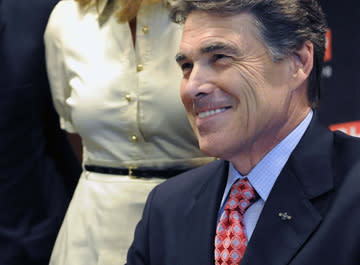 The Ticket
The TicketPerry’s book advocates a limited role for the president and the courts

As the exclamation point in the title suggests, Texas Gov. Rick Perry is angry in his book, Fed Up! Our Fight to Save America from Washington --or let's say "passionate"--about state governments losing the battle for control with the federal government. In less than 200 pages, the Republican presidential candidate finds fault with almost every federal institution in existence.
There will be several standards by which to judge Perry during his campaign for the presidency, but the bar he sets in his manifesto will by far be the most difficult one for him to live up to. His vision for the role of the federal courts, the Congress and the president is so narrow that it will be hard for him to avoid charges of hypocrisy every time he even thinks about moving the White House furniture. He lays the foundation for an extremely limited presidency, of the sort arguably not seen since the era of Calvin Coolidge.
The Courts
A reader of Perry's book quickly discovers that the federal courts--specifically the Supreme Court--is the Texas governor's most-loathed institution. He disapproves of the role of the the court as the chief interpreter of the Constitution, and he criticizes many of its decisions.
Here's a sampling:
- Perry disagrees with Griswold v. Connecticut, the 1965 case that overturned a law prohibiting the use of birth control, even for married couples. He calls the reasoning in the decision "total and complete nonsense."
- He thinks local education systems should be able to make their own decisions about prayer in the classroom.
- Closer to home, Perry objects to the 2003 Lawrence v. Texas decision, which overturned a state law that banned non-vaginal sex, but was enforced only on homosexuals.
- Perry supports a constitutional amendment that would allow a two-thirds majority in Congress to overturn any Supreme Court decision.
Constitutional Amendments
Despite his detest for federal policies that override state law, Perry has made the case over the past month that he's fine with changing local rules so long as it's done via a constitutional amendment. For example, despite saying that he's "fine" with New York passing a gay marriage law, he also supports overturning that very law through the amendment process.
In "Fed Up," Perry expresses implicit support for two more constitutional amendments--ones that would repeal existing amendments.
He calls the Sixteenth Amendment, which created a federal income tax, "the great milestone on the road to serfdom."
And he disagrees with the Seventeenth Amendment, which allowed for the direct election of senators.
Marijuana Policy
Perry does not support laws that legalize or decriminalize marijuana, and as governor, he has cracked down on people who use and sell the drug. But if elected president, he suggests in his book, he would be open to handing those policy decisions over to state control.
He lists marijuana alongside other issues that are clearly important to him--school prayer, health care, education, guns--as ones the states can handle. He calls the passage of medical-marijuana laws "the best example" of states fighting against federal authority.
In "Fed Up," Perry signals that he would be fine if local law enforcement decided to look the other way when there's a split between local law and federal policy.
"[G]ood luck to the federal government if it wants to enforce every law on its books without the help of state and local law enforcement," he writes.
Climate Change
Perry calls global warming "one contrived phony mess that is falling apart under its own weight. Al Gore is a prophet all right, a false prophet of a secular carbon cult."
Social Security
"By any means, Social Security is a failure," he writes. Perry has since mused about a plan that would put programs like Social Security in the hands of the states.
He calls Social Security "something we have been forced to accept for more than 70 years now" and a "crumbling monument to the failure of the New Deal."
The Presidency
If elected, and if he stays true to his own guidelines in the book, Perry in some ways would be reducing his level of power by leaving his governorship. It would seem that he wants the job of president so he can squash it.
Assuming that Perry does not succumb to the temptation of power that will no doubt wash over him the minute he moves into the White House, he is setting himself up to be a quiet president (by today's standards) on all matters not clearly enumerated within the Article Two of the Constitution.
The question for those who agree with his prescriptions is: would he really be able to give up the power that has accrued to the office of the presidency over the past century?


